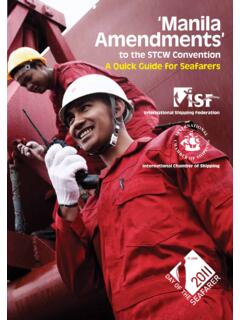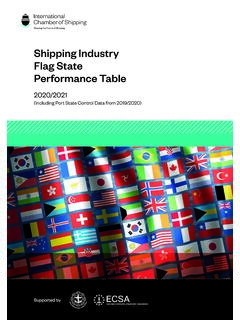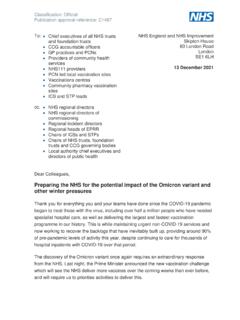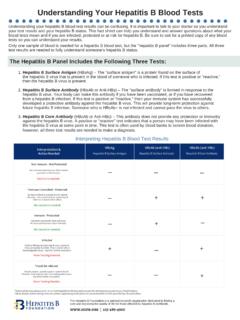Transcription of Coronavirus (COVID-19)
1 Coronavirus (COVID-19)Legal, Liability and Insurance Issues arising from Vaccination of SeafarersIn collaboration withVersion December 2021 The International Chamber of Shipping (ICS) is the global trade association representing national shipowners associations from Asia, the Americas and Europe and more than 80% of the world merchant fleet. Established in 1921, ICS is concerned with all aspects of maritime affairs particularly maritime safety, environmental protection, maritime law and employment affairs. ICS enjoys consultative status with the UN International Maritime Organization (IMO) and International Labour Organization (ILO).
2 Coronavirus (COVID-19): Legal, Liability and Insurance Issues arising from Vaccination of Seafarers Published by Marisec Publications Walsingham House, 35 Seething Lane, London, EC3N 4 AHVersion December 2021 Tel: +44 20 7090 1460 Email: International Chamber of Shipping 2021 While the advice given in this Guidance has been developed using the best information available, it is intended purely as guidance to be used at the user s own risk. No responsibility is accepted by Marisec Publications or by the International Chamber of Shipping or by any person, firm, corporation or organisation who or which has been in any way concerned with the furnishing of information or data, the compilation, publication or any translation, supply or sale of this Guidance for the accuracy of any information or advice given herein or for any omission herefrom or from any consequences whatsoever resulting directly or indirectly from compliance with or adoption of guidance contained therein even if caused by a failure to exercise reasonable care.
3 3 Contents1 Introduction 42 Maritime Labour Convention, 2006, as amended (MLC, 2006) 53 Frequently Asked Questions 74 Other Considerations for Discussion 1541 IntroductionThis Guidance addresses legal, liability and insurance issues that could potentially arise for shipowners from or in connection with vaccinations of crew for Coronavirus (COVID-19). It considers questions that have been raised by members such as: whether and under what conditions a shipowner can require crew to have vaccination, what vaccines may be safely given and what might be the potential liabilities for shipowners in requiring crew vaccinations. It provides guidance on best employment practice to protect against such liabilities and information on insurance cover for such liabilities under the shipowner s standard Protection and Indemnity (P&I) Guidance forms part of the ICS COVID-19 industry guidance, which can be found at: Maritime Labour Convention, 2006, as amended (MLC, 2006) The starting point for analysis is the Maritime Labour Convention, 2006 (MLC, 2006), which provides for minimum standards and rights of seafarers and which has been ratified by and implemented in over 100 countries.
4 Article 4 of the MLC includes minimum requirements on shipowners to provide access to medical care on board ship and ashore. MLC does not include provisions for vaccinations/immunisations. As there are no express provisions in the MLC regarding vaccinations, it is necessary to turn to national law, either of the flag State which may regulate this (and which may govern also the seafarer s contract of employment) or the law of the seafarer s country. It is not feasible to conduct a review of the laws of all states but some general principles can be drawn (based on English law as a focus). General Employers duty of care and obligation to reduce risks in the workplaceUnder established law, employers have a duty of care to protect their employees.
5 Supplementing this general legal obligation, UK statutory law places an obligation on employers to take reasonable steps to reduce any workplace risks (the Health and Safety at Work Act 1974); in the context of COVID-19, this obligation would justify employers encouraging employees to be vaccinated to protect themselves and everyone else at the workplace. This encouragement can be given by providing employees with reliable information and guidance. The UK government has issued such guidance for healthcare workers and which could form a template for other workplaces, see: Informed and voluntary consent to the vaccinationVaccination requires an individual s informed and voluntary consent.
6 If an employee refuses vaccination, employers should consider the reasons given carefully. Each case will need to be considered on its own facts and an individual response made accordingly. Depending on the particular circumstances, this response could entail implementing alternative solutions to protect the refusing employee and others in the workplace. This could include the use of personal protective equipment (PPE), additional social distancing measures and changing the employee s work duties to reduce contact with other employees. Ultimately, however if the employee s presence in the workplace is deemed to pose a threat to the health and safety of the wider workforce, employers may consider not allowing unvaccinated employees to work.
7 This decision 6should always be made carefully and preferably, with legal advice as to what actions might legitimately be taken to protect the safety of the workplace and to also protect the unvaccinated employee s rights of Data protection and privacyAll information about an employee s health, including whether an employee has received a vaccine will constitute special category data under data protection laws such as the General Data Protection Regulation (EU) 2016/679 (EU GDPR) and the UK General Data Protection Regulation (UK GDPR) tailored by the Data Protection Act 2018 (DPA 2018). Employers who choose to collect and keep (process) records of vaccinations should therefore do so in accordance with all such applicable laws.
8 The UK data protection legislation and the EU GDPR, for example, prohibit processing of special category data unless it is necessary and proportionate. Such processing could be justified on the basis that it is necessary to comply with the employment contract, or other employment law requirements including, the employer s health and safety or occupational health duties and for reasons of public interest in health. All data relating to an employee s health must be kept securely and should not be retained any longer than is necessary to perform duties as an employer. Such data should not be disclosed to third parties unless the employer is legally obliged to do so.
9 Employers should have a privacy policy for employee information and should carry out a data risk assessment covering the processing of special category data to ensure compliance with key data protection principles. Important data protection principles include: ensuring data processing is transparent, that it is secure and that it is kept to the minimum necessary. Employers should consider and document the risk to employees and any alternatives to obtaining and processing the data. Employee Privacy Policies should be regularly reviewed and Frequently Asked Safety and Liability Issues Can a shipowner require/mandate seafarers to get a COVID-19 vaccine?
10 For the reasons already noted in section above, under UK law, an employer cannot compel an employee to be vaccinated (or indeed to take any form of medication) if they do not wish to be so (as this raises issues of intrusion on an employee s body and breach of their human rights on medical intervention under UK law and the European Convention on Human Rights). The same would apply for the COVID-19 vaccine. The UK government has indicated that the government does not plan to make the vaccine mandatory. Other countries may take a different approach and mandate certain vaccines to be compulsory (or demand proof of vaccination as a border or visa requirement).







